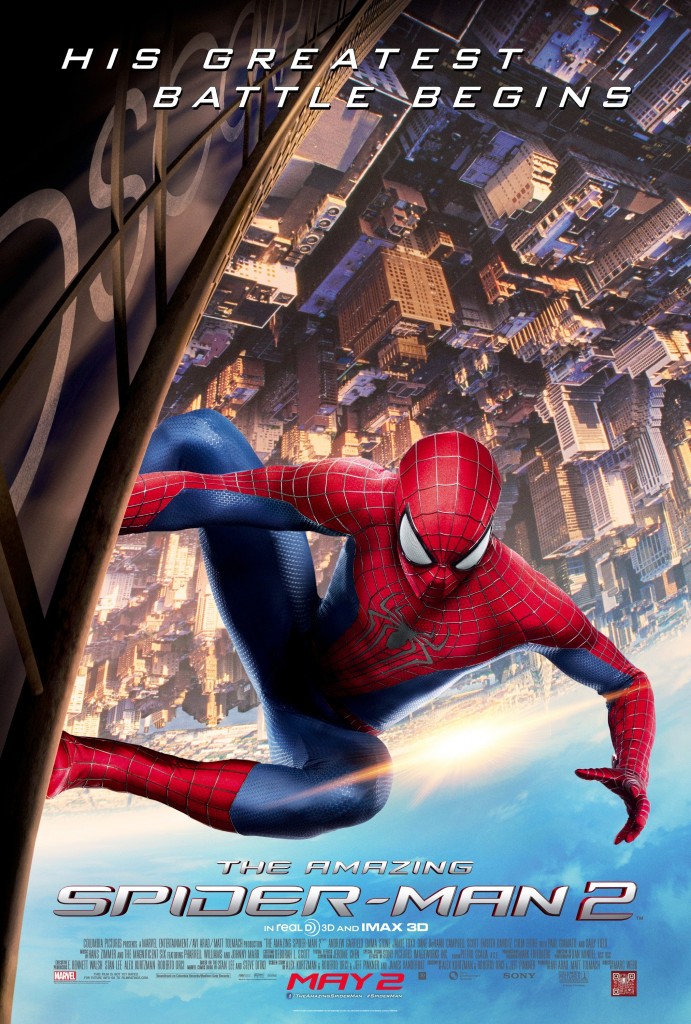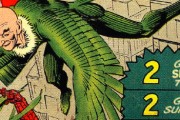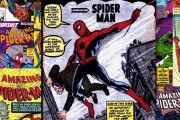I’m breaking form today and for the first time in Chasing Amazing history writing a reaction to something that is not about a comic book. Here it is dear readers, the first official Chasing Amazing post about a film: Marc Webb’s The Amazing Spider-Man 2 (PS spoilers ahead)
I’ll readily admit I had extraordinarily low expectations for this film, in large part because I thought its predecessor, 2012’s The Amazing Spider-Man, was a dull and pointless endeavor geared towards Sony maintaining its copyright to produce Spider-Man movies. There were moments from that first movie that I thought were worthwhile – most notably everything having to do with Peter (Andrew Garfield) and Gwen (Emma Stone). But otherwise, this was not a movie I needed to see. I didn’t care what Webb had to say about Spider-Man’s origin and all of this nonsense about Peter’s parents, and felt little to any engagement to the film’s primary villain, the Lizard.
The Amazing Spider-Man 2 is superior to the original, but it still suffers from many of the same flaws. Perhaps what makes this film experience a bit better is that there are a few more nuggets of interesting character moments and comic book quoting for me to latch on to when compared to its predecessor.
Garfield and Stone are marvelous as Peter and Gwen, and unquestionably have more romantic (and even platonic) chemistry than the Tobey Maguire/Kirsten Dunst pairing from the Sam Raimi Spider-Man franchise. Watching Peter navigate this tumultuous relationship with a larger than life heroine is a sight to behold, and Stone just owns every scene as Gwen.
It also helps that Webb and Co. have taken great liberties with Gwen’s character. Gwen is as strong a female as you can find in a comic book movie – in some ways even stronger than some of the actual female superheroes who have worked their way onto the big screen. She’s every bit Peter’s equal, which is what makes her ultimate end all the more tragic. Stone makes me care about Gwen in a way I never truly cared about her in the comics. The comic book community talks about “The Night Gwen Stacy Died” with such reverence – and rightly so, since it’s a landmark moment in the industry. But are our reactions predicated on how well crafted the character is, or how the story of the comic itself changed the landscape of the medium for generations?
Because I already had the ending spoiled for me (thanks Internet), I knew that a lot of my final thoughts about this movie were riding on how Gwen’s death was going to be portrayed. Sony nailed it, giving the moment all the gravitas and drama it rightly deserved. Physically, the scene quotes extensively from the comic – using a clock tower instead of a bridge not withstanding – but because Webb and Stone make me care so much for Gwen, it transforms an iconic comic book moment into an even greater cinematic moment.
That’s awfully high praise for a movie that I’m not even sure I can say I “liked.” And that’s a major reason why I’m so frustrated by The Amazing Spider-Man 2. There’s the Peter/Gwen stuff and Gwen’s death, not to mention a host of other fine character moments that either made me reminiscent for the comics, or improved upon the source material. For example, a scene where Peter confronts Aunt May (Sally Field) about the mystery behind his parents’ disappearance and she tells her nephew that the past is immaterial because he’s her “boy.” That was about as good of a Peter/Aunt May moment as I’ve ever seen, including the comics.
The movie also makes a point of showing Spider-Man connecting with regular people – something that was sorely lacking from the Raimi trilogy. I say Peter is a relateable character so much around here, it might as well be the tagline of this site, but it is truly joyous for me to see that conveyed cinematically. Whether it’s telling the painfully awkward Max Dillon (Jamie Foxx) pre-Electro that he’s his “eyes and ears” or watching him defend a small, scientifically-gifted boy from bullies, these scenes emotionally resonate with me both as a viewer and a fan of Spidey. Even Peter’s initial conversation with Dane DeHaan’s Harry Osborn – where he offers his condolences for the death of his father Norman (Chris Cooper in a painfully underutilized role) – ripples with the energy and spirit of the comics.
But these moments are fleeting and not enough to make me blindly like the whole thing. There’s still way too much focus on Peter’s parents, including an almost painfully boring middle act to this film that even goes as far as to bring us to a secret location, while still failing to make me actually care about this subplot. This is where Sony’s curious embarrassment with the comic book source material truly frustrates me. Peter’s reason for being Spider-Man – his feeling of responsibility for the death of his Uncle Ben – is as concise and understandable of a story as there is in comics, and yet Sony just refuses to put Ben on a pedestal in this franchise. Instead, we get references to Peter’s parents, or his guilt for the death of Captain Stacy, but never actually the person I’ve long believed was the biggest influence on his life – the actual father figure who treated him like a son and morally guided him to the path that would eventually make Spider-Man a hero.
The film is also dragged down by the quality and characterization of its villains. One of my biggest concerns headed into The Amazing Spider-Man 2 was its overabundance of bad guys – three by my count with Electro, Green Goblin and Rhino, and that’s not even counting the plethora of adversaries that were introduced for future films: Vulture, Doc Ock, Venom, Alistair Smythe, and lest we forget Norman Osborn, who gets so little face time in this film you have to think the only reason he is introduced is because Sony is checking off as many boxes it can before it expands its franchise in coming summers (also see what Warner Bros. is doing with the DC Universe and Batman/Superman into Justice League).
Prior to its release, Webb said numerous times that Electro was the main villain of this movie, but The Amazing Spider-Man 2 does a poor job of actually making him feel like the focus, especially when you consider the film’s climax. And when Electro is on screen, his characterization feels way off. Liberties are always going to be taken in comic book movies, and it would be naïve of me to think the yellow and green, lighting bolt-masked head of Dillon would find its way to the big screen. But I do think there are some core elements of the character that the film grossly ignores. Part of what makes the Stan Lee/Steve Ditko cast of villains so memorable is the fact that almost all of them are the inverse of Peter when it comes to power and responsibility. Guys like Electro, Sandman, Green Goblin and Doc Ock all acquire great powers but use those powers to achieve nefarious things.
I think the “psycho Spider-Man fan/unrequited lover” angle for Electro sucks a lot of the corny fun out of the original character. Beyond the characterization, the battle sequences between Spidey and Electro are brainless and soulless – just large digital set pieces that visually read more like video game cut sequences, rather than dramatic cinematic moments.
And how can Webb claim Electro is the main villain when the Green Goblin is so demonstratively thrust upon the audience? I initially liked the idea of Harry’s character being a part of this movie as a friend-turned-adversary, but his character arc in this film gets doesn’t get enough time to properly maturate. And this poor character development has a domino effect on the entire film. Because of Sony’s insistence of working in this character, we get a few other flimsily worked in plot points: Peter’s photography with the Daily Bugle which gets a passing mention only to serve story over character, or the blink and you’ll miss them incorporation of characters like Felicia Hardy/Black Cat or Smythe. Even Harry’s role in Gwen’s death – a scene I liked – feels tacked on and lazy.
Paul Giamattai as Rhino/Alekesi Sytsevich is a distraction for a completely different reason. I love Giamatti, but his performance here is embarrassingly overindulgent. It speaks to the larger issue of the film’s lack of a consistent tone. The Amazing Spider-Man 2 warbles between love story, action drama, spy thriller and camp. All of these things in isolation are perfectly acceptable, but lumped together lack grace and coherence. An argument can be made that the Spider-Man comics themselves can shift in tone depending on the writer and the storyline (one would never confuse J.M. DeMatteis and Dan Slott as the same writer), but The Amazing Spider-Man 2’s tone shifts so sharply, sometimes within the same sequence, that I wasn’t certain I was watching the same film. Where did this characterization of Dr. Kafka come from? What was up with “Itsy Bitsy Spider” finding its way into a final fight sequence between Spidey and Electro?
I would be remiss in talking tone and “Itsy Bitsy Spider” without mentioning Hans Zimmer’s intrusive score. Typically, for me, a film’s score is one of those things that’s a tremendous boost to a film’s legacy (i.e. every John Williams score from the 1970s and 1980s) or has no impact at all. But The Amazing Spider-Man 2 is one of those rare instances where a film’s orchestrations negatively impacts my viewing experience. Beyond the fact that I don’t associate Spider-Man, in any iteration, with soaring, triumphant Superman-esque trumpets, I also found Zimmer’s orchestrations to swell up and crescendo at odd times.
Ultimately, I still don’t have any real investment in this franchise reboot, and found myself seeing this movie more out of obligation to the character. At the same time, I can’t just sit here and hate on the experience either, as there were some things I was quite fond of. There’s not enough there to get me jazzed for the third movie and the Sinister Six and Venom spinoffs, but I’m also not ready to totally bail either. In other words, if I were in the habit of handing out stars or number grades, I would probably settle somewhere right in the middle.






I’m jealous of your ability to write about this film. I agree with just about everything you said and you put it far more succinctly and clearly than I did in my piece.
I have the same level of apathy going into the movie as well. I wished that I could like the movie more, but there are just too many things that you mentioned that I can’t get over. Like, the tonal whiplash, or the tacked-on feeling to the Green Goblin climax, or the dreadfully dull parents sub-plot.
Why was I under the impression that this was the Amazing Girlfriend of Spider-Man and not the Amazing Spider-Man? I cannot find one interesting part of Peter Parkr’s arc and then it hit me like a sledgehammer. There was no arc for Peter. Everything he was in this film revolved around other characters or simply had been recycled from the previous film. Peter’s parents like you said was uneccesary and did nothing for the character besides finding Rooseevelt which added absolutely nothing to Peter’s arc other than to show us that Peter’s parents left town because they were branded traitors. Well that is all fine and dandy if there was already this context made in the previous installment. Peter’s exhile prior to being bitten would have been much more clear and understanding had this been reached last time. Everybody knows if there is a traitor on US soil and Peter for being a spawn of two would have gotten hell for it in school. Now that would have made an interesting origin story.
Everything else revolves around his love for being Spider-Man, which got dreadfully boring once Electro showed up and Spidey was tasked by the NYPD of all establishments to save them. When has that EVER happened? Where’s the hate, the fear, the overall media bashing that’s previlent in these stories? It’s almost like Webb and co. said we had enough of those stories in the previous Raimi films so we’re not gonna use them. Webb claims to be a superfan of the character yet he lets this happen why? Joel did the same thing with Batman and Robin by removing the tortured psyche of Bruce Wayne just because they could. That film is reviled amongst it’s peers why wasn’t ASM2?
Then there’s the biggest mistake of any Spider-Man film. Peter doesnt learn anything. The first film at least tried to convey a lesson (one he ultimately threw out to be with Gwen, but it was a lesson about responsibility. This goes beyond Ben Parker’s ommision as the main inspiration behind Spider-Man’s quest to keep fighting the good fight. No it’s far more worse. Where’s the 5 months Peter was absent as Spider-Man? Where’s the emotional growth, the lesson he had to learn about responsibility, the grieving process as he lives without Gwen knowing full well he was the cause. Had he given the blood transfusion or at least did something to see if his friend could be cured, perhaps Gwen could still be alive. That self torture is classic Spider-Man and one key component to what makes him relatable and rich. There was a key moment to reflect and give this sorry adaptation some actual weight and Webb chose not to give us it. Instead we get a packing up of things and a return to the costume once a supervillain rears it’s ugly head without any weight behind it. It was the Man of Steel ending all over again. Instead of a hero who learns from his mistakes we get a sociopath because these hacks hav no clue as to what makes these characters tick.
Enjoyed your review and agreed with much of it, but I thought it was a great movie. The chemistry between Gwen and Peter was excellent.